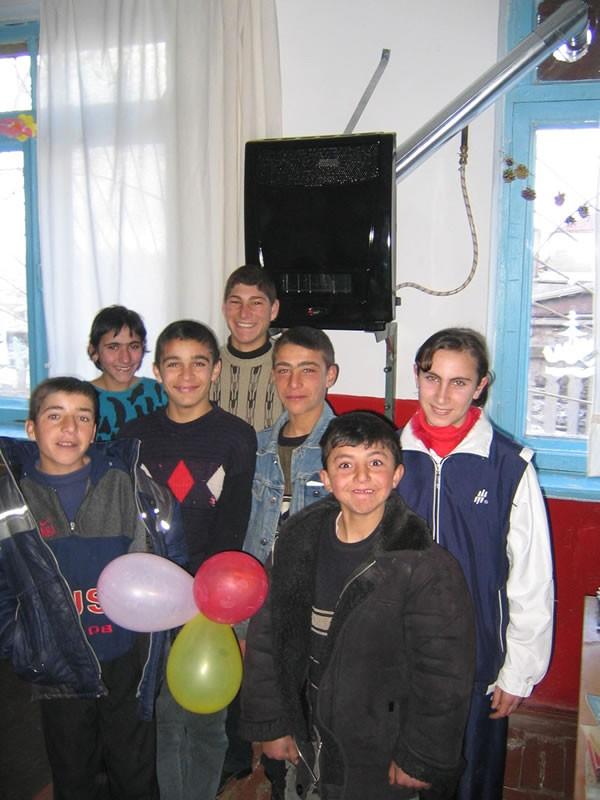
Special Schools are a Way to Avoid caring for Children
The only special school in the Gegharkunik province intended for the mentally disabled and deaf children is located in the town of Gavar. There are 97 children in the school, but according to Principal Lavrik Arevshatyan, there are 120 children with such disabilities in the province that don't attend the school. The reasons differ - in some cases one parent wants to send the child to the school but the other doesn't. Some parents choose to keep children with disabilities at home so as not to reveal them to the public. For others, the remoteness of the school from home is the problem. Those who don't attend the school are mainly residents of the province villages. The number of mentally disabled children, according to the principal, is particularly great in the village of Lchashen in the Sevan region.
Lavrik Arevshatyan told us that two years ago when he was appointed principal there were 71 children at the school. As a result of an awareness campaign carried out jointly with the organization Medecin Sans Frontieres the number reached 97. There are children who set foot in school for the first time at the age of 13. Teachers note, however, that at this age it is very hard for them to get accustomed to the learning environment.
There was progress in other matters as well - for the first time in its 30 years of existence, with the assistance of international organizations, the bathrooms and part of the kitchen have been renovated. Mission East, a humanitarian aid organization, provided training for teachers. Counterpart International, a non-profit organization, provided the school with beds and a Gazelle minivan. "We haven't had beds in our bedrooms for thirty years, and now we do. We drive the children from remote places such as Tchambarak or Vardenis home every other week-end and drive them back on Monday," the principal said.
 |
 |
All the phenomena that characterize similar educational institutions throughout Armenia exist at the special school in Gavar as well. Here, too, children from socially insecure families have found a "refuge". Their parents brought them to the boarding school tempted by the opportunity to rid themselves of the burden of caring for and feeding their children. Or children are from the same family, because their parents don't want separate their children with disabilities from the healthy ones. Each child in the school has his or her personal card where the disabilities are listed. According to Lavrik Arevshatyan, their studies are organized based on different programs - the programs for healthy children are a little harder, while the disabled children study in accordance with individual programs. The principal believes it is correct that the children are in school together. "Interacting with healthy children, the others make serious progress."
Thirty-five children sleep over at the Gavar boarding school. They are mostly from remote villages. For others, the school day ends at 5:30 p.m., because the state encourages links between the children and their families, their living together. Nevertheless, the impression is that the boarding school has turned into an orphanage. As Deputy Principal Hasmik Marukhyan noted, many parents who live in Gavar don't want their children to sleep at home. "Children ask to go home-they miss their friends-but there are parents who force their children to stay at school at night. There are people who live in the school neighborhood who insist that we send their children home only once every 15 days. There are children who only go home from vacation to vacation. One of the reasons is the difficult social situation of the families, and that boarding school is a way to get rid of the burden of feeding and caring for the children." Marukhyan says that they feed children four times a day. And during vacations, the children impatiently look forward to returning to the school.
Principal Arevshatyan told us that few parents take part in upbringing their children; 5-10% of them visit the school at best. "There are parents who brought their children here to get rid of them," the deputy principal added. She said that there are mothers with certain lifestyles who force their children to stay at the school at night. We wondered if it wasn't hard to take care of these children, especially when difficult kids, children with disabilities are involved, and the school has just one psychologist. The deputy principal explained that the parents are not much interested in their children; many of them just disturb the educational process. After classes are over, tutors come to help the children to do their homework.
For educational purposes and to help children to learn a profession, various workshops - sewing, carpentry, shoe repairing, etc. - used to be held in special schools. But because of the pitiful financial situation of the school, it has no means to organize training for them. At the moment, all it offers is needlework for the girls and shoe repair for the boys.
 Videos
Videos Photos
Photos




Write a comment